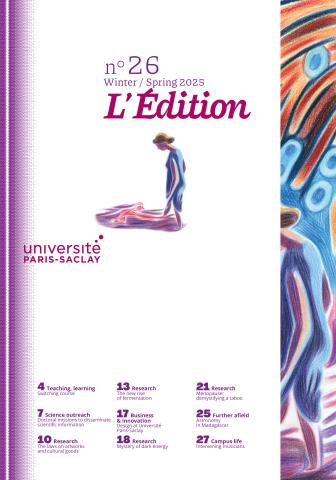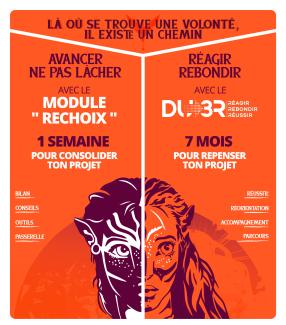
Switching course: solutions for students looking to change direction
This article was originally published in L'Édition n°26.
Sometimes, after starting university, students become unhappy with their chosen course. Whether it's through personal interviews, the Rechoix (Choose again) module or the "React, Rebound, Succeed" institutional degree (DU3R), Université Paris-Saclay offers a range of support services to help students (re)consider their academic journey, assess their career options and find the most appropriate course for them.
Choosing a study path straight out of secondary school isn't always easy, and deciding on a future career can be just as challenging. Consequently, some first-year students become unhappy with their chosen course once it has started. For example, their choice of discipline may not meet their expectations, or they may not like the structure of the course or the associated career opportunities may no longer appeal to them. What solutions are available to them?
"The first thing they should know is that changing course isn't a big deal," explains Pascal Aubert, Director of the Paris-Saclay Undergraduate School. As a cross-disciplinary constituent faculty and institute of Université Paris-Saclay, the Undergraduate School is responsible for coordinating initiatives based on student success on the undergraduate programme. "One of our priorities is to help students build a clear academic and career path. For us, student success is above all about finding the right direction and pursuing your plan." To this end, the Paris-Saclay Undergraduate School supports the introduction of the personal study integration project (PPEI/PPP), a set of teaching units common to all undergraduate fields of study, which begins in the first year. Through presentations and workshops, this project aims to help students gain a better understanding of themselves, shape their academic journey and envisage their future in the professional world.
For some students, this initiative can sometimes lead to the realisation that they are not on the right path. "We can then suggest that they choose a gateway to another qualification in the same discipline, or switch to a different field of study," continues Pascal Aubert. "Changing course means switching programmes, whether in terms of discipline, format or field of study." The Paris-Saclay Undergraduate School is currently working hard on this issue, in association with all the constituent faculties and institutes and departments of Université Paris-Saclay. For example, in the Department for Education and Success (Direction de la Formation et de la Réussite, DFR), there is an office dedicated entirely to career guidance and integration (OIP).
Personal interviews to develop career paths
"Every year, we welcome between 400 and 500 students who are questioning their academic journey and career path," confirms Aude Ricard, Careers and Integration Counsellor at the DFR. Over the 2023-2024 academic year, more than 40% of interview requests to the OIP office related to a change of course. "These interviews aim to work with students to assess what is and isn't going well with their current course." To achieve this, career advisors use a structured approach to career planning, providing tools and resources through different phases, either to confirm the current path or build a new one.
"What students often lack is self-knowledge: understanding what interests them, what motivates them and what they need to succeed. These are decisive criteria when it comes to choosing academic courses. In France, we're fortunate to have a wide range of courses, each designed to meet different needs. Understanding this is key to making the right choice, whether starting out or changing direction," explains Aude Ricard. It's also a question of timing.
At Université Paris-Saclay, students can change courses at two points: between the first and second semesters, or at the end of the academic year. At each of these points and depending on the situation, "we've put in place various solutions to meet the needs of those who may be reconsidering their choices," says Pascal Aubert. For example, a student who knows the exact course to which they want to switch does not go through the same process as someone who wants to leave their current course, but doesn't yet know what they want to do next.
A module for developing a new academic path
In the Île-de-France region, a major initiative has been launched on the issue of career guidance. Bringing together fourteen universities including Université Paris-Saclay, the ORACCLE project (Orientation Régionale pour l'Accompagnement du Continuum Lycéens – Étudiants, Regional guidance to support the secondary school-student continuum) aims to facilitate course changes and prevent students from dropping out of higher education. As part of this project, Université Paris-Saclay has introduced a new module this year, the "Rechoix" (Choose Again) or "Réinvente ton avenir" (Reinvent your future) programme which specifically targets students looking to change direction. The first session, held in November 2024, was a week-long programme to help participants better understand themselves, clarify their academic and career plans and finalise their next steps.
Activities included presentations on existing courses, meetings with professionals, workshops on writing a covering letter and even time for researching courses and professions. In addition to this first session of the "Reinvent your future" programme, "there will be a second session, taking place over four weeks between February and March 2025, which will provide more comprehensive support for changing career paths. We're asking participants to go further in their research, to explore various professions and more," explains Aude Ricard. Université Paris-Saclay is one of the first universities to experiment with this scheme for the ORACCLE project, with the ultimate aim of implementing similar modules in other universities in the Paris region.
At the end of this module, there are several options available to each student. If they succeed in confirming and finalising their academic and career path for the second term, they can switch courses depending on existing gateways or available places, using the e-candidat platform. If changing courses between the first and second terms is not an option, the candidate continues into the second term and switches at the end of the year using the Parcoursup platform. Finally, some students may not be able to finalise their plan or may still feel the need to explore the issue further. In this case, they can be referred to other solutions for assistance.
Reacting and rebounding with the DU3R
Université Paris-Saclay also offers support for those who are even more uncertain with the "React, Rebound, Succeed" (Réagir, Rebondir, Réussir, DU3R) institutional decree created by the Paris-Saclay Undergraduate School. Unlike the "Reinvent your future" module, this is a one-year programme leading to a full qualification that has been officially recognised with the "Passeport pour réussir et s'orienter" (Passport for success and career orientation - PaRéO) label. "The DU3R is designed for secondary school graduates who are unsure about their post-baccalaureate choices or who haven't yet secured a place for the start of the academic year, as well as first-year students experiencing difficulties," explains Pascal Aubert. There are two start dates scheduled for the DU3R, with different application procedures. The first intake takes place in September and is accessible via an application on Parcoursup, while the second takes place in November and is accessible by contacting the person in charge of the DU3R's educational coordination.
Once they have started, the two groups of up to 25 students follow a similar programme of lectures, workshops, internships and meetings. "The benefit of the DU3R is that it's not just about changing career paths. There's also a lot of work on developing skills, shaping professional integration, exploring various disciplines and associated courses, educational projects, etc. It's a very comprehensive qualification. It also includes a period at the end where students are free to do an internship, volunteer or work, with the aim of deciding their next move," explains Aude Ricard. At the end of the DU3R, if participants have succeeded in finalising their career plan, they can move on to the course of their choice the following year.
Whether you're just starting a course, between terms, or at the end of the year, if you're in any doubt about your career path, it's important to get help, according to the Careers Counsellor. "It helps to ask yourself the right questions and come up with plans that are coherent and realistic," she stresses. "It also shows students that they are not alone and that at Université Paris-Saclay, we have plenty of resources to deal with these situations."
Learn more :

This article was originally published in L'Édition n°26.
Find out more about the journal in digital version here.
For more articles and topics, subscribe to L'Édition and receive future issues:
